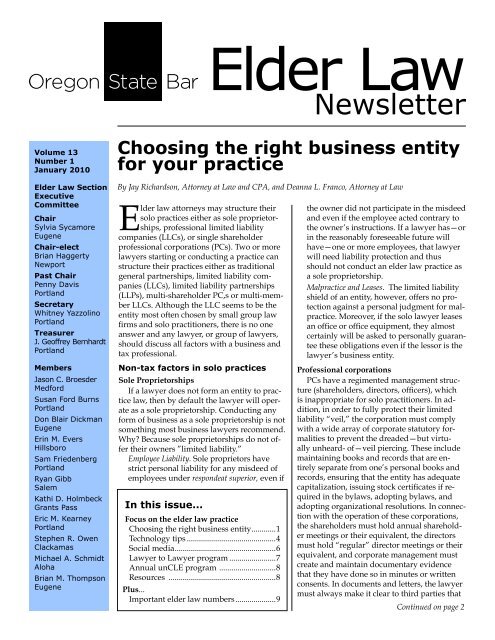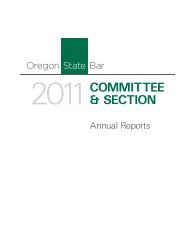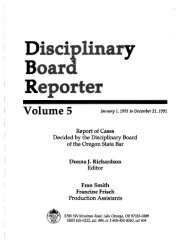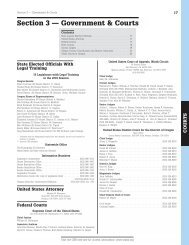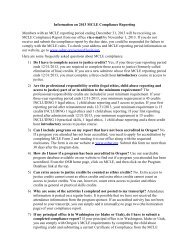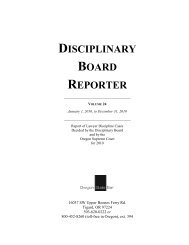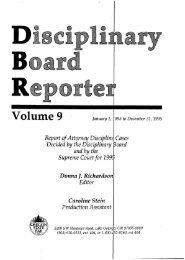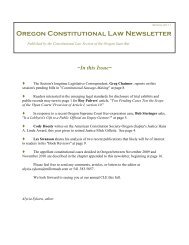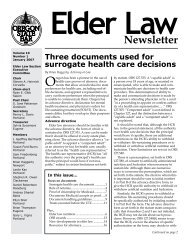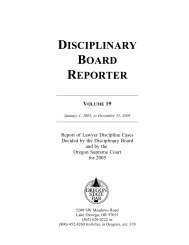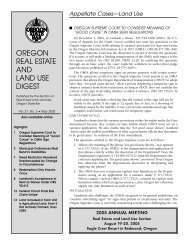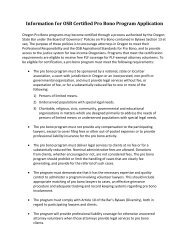Newsletter - Oregon State Bar
Newsletter - Oregon State Bar
Newsletter - Oregon State Bar
You also want an ePaper? Increase the reach of your titles
YUMPU automatically turns print PDFs into web optimized ePapers that Google loves.
Volume 13<br />
Number 1<br />
January 2010<br />
Elder Law Section<br />
Executive<br />
Committee<br />
Chair<br />
Sylvia Sycamore<br />
Eugene<br />
Chair-elect<br />
Brian Haggerty<br />
Newport<br />
Past Chair<br />
Penny Davis<br />
Portland<br />
Secretary<br />
Whitney Yazzolino<br />
Portland<br />
Treasurer<br />
J. Geoffrey Bernhardt<br />
Portland<br />
Members<br />
Jason C. Broesder<br />
Medford<br />
Susan Ford Burns<br />
Portland<br />
Don Blair Dickman<br />
Eugene<br />
Erin M. Evers<br />
Hillsboro<br />
Sam Friedenberg<br />
Portland<br />
Ryan Gibb<br />
Salem<br />
Kathi D. Holmbeck<br />
Grants Pass<br />
Eric M. Kearney<br />
Portland<br />
Stephen R. Owen<br />
Clackamas<br />
Michael A. Schmidt<br />
Aloha<br />
Brian M. Thompson<br />
Eugene<br />
Elder Law<br />
<strong>Newsletter</strong><br />
Choosing the right business entity<br />
for your practice<br />
By Jay Richardson, Attorney at Law and CPA, and Deanna L. Franco, Attorney at Law<br />
Elder law attorneys may structure their<br />
solo practices either as sole proprietorships,<br />
professional limited liability<br />
companies (LLCs), or single shareholder<br />
professional corporations (PCs). Two or more<br />
lawyers starting or conducting a practice can<br />
structure their practices either as traditional<br />
general partnerships, limited liability companies<br />
(LLCs), limited liability partnerships<br />
(LLPs), multi-shareholder PC,s or multi-member<br />
LLCs. Although the LLC seems to be the<br />
entity most often chosen by small group law<br />
firms and solo practitioners, there is no one<br />
answer and any lawyer, or group of lawyers,<br />
should discuss all factors with a business and<br />
tax professional.<br />
Non-tax factors in solo practices<br />
Sole Proprietorships<br />
If a lawyer does not form an entity to practice<br />
law, then by default the lawyer will operate<br />
as a sole proprietorship. Conducting any<br />
form of business as a sole proprietorship is not<br />
something most business lawyers recommend.<br />
Why? Because sole proprietorships do not offer<br />
their owners ”limited liability.”<br />
Employee Liability. Sole proprietors have<br />
strict personal liability for any misdeed of<br />
employees under respondeat superior, even if<br />
In this issue...<br />
Focus on the elder law practice<br />
Choosing the right business entity ............1<br />
Technology tips ............................................4<br />
Social media ..................................................6<br />
Lawyer to Lawyer program .......................7<br />
Annual unCLE program ............................8<br />
Resources .....................................................8<br />
Plus...<br />
Important elder law numbers ....................9<br />
the owner did not participate in the misdeed<br />
and even if the employee acted contrary to<br />
the owner’s instructions. If a lawyer has—or<br />
in the reasonably foreseeable future will<br />
have—one or more employees, that lawyer<br />
will need liability protection and thus<br />
should not conduct an elder law practice as<br />
a sole proprietorship.<br />
Malpractice and Leases. The limited liability<br />
shield of an entity, however, offers no protection<br />
against a personal judgment for malpractice.<br />
Moreover, if the solo lawyer leases<br />
an office or office equipment, they almost<br />
certainly will be asked to personally guarantee<br />
these obligations even if the lessor is the<br />
lawyer’s business entity.<br />
Professional corporations<br />
PCs have a regimented management structure<br />
(shareholders, directors, officers), which<br />
is inappropriate for solo practitioners. In addition,<br />
in order to fully protect their limited<br />
liability “veil,” the corporation must comply<br />
with a wide array of corporate statutory formalities<br />
to prevent the dreaded—but virtually<br />
unheard- of—veil piercing. These include<br />
maintaining books and records that are entirely<br />
separate from one’s personal books and<br />
records, ensuring that the entity has adequate<br />
capitalization, issuing stock certificates if required<br />
in the bylaws, adopting bylaws, and<br />
adopting organizational resolutions. In connection<br />
with the operation of these corporations,<br />
the shareholders must hold annual shareholder<br />
meetings or their equivalent, the directors<br />
must hold “regular” director meetings or their<br />
equivalent, and corporate management must<br />
create and maintain documentary evidence<br />
that they have done so in minutes or written<br />
consents. In documents and letters, the lawyer<br />
must always make it clear to third parties that<br />
Continued on page 2
Elder Law Section <strong>Newsletter</strong> January 2010<br />
Choosing the right business entity Continued from page 1<br />
Jay Richardson’s<br />
practice emphasizes<br />
taxation, business<br />
formation and<br />
transactions, estate<br />
planning, and<br />
employee benefit<br />
plan consulting.<br />
Jay is a<br />
Certified Public<br />
Accountant<br />
and Certified<br />
Management<br />
Accountant.<br />
Deanna L. Franco’s<br />
practice focuses on<br />
estate planning,<br />
probate and trust<br />
administration,<br />
guardianship and<br />
conservatorship<br />
matters, entity<br />
formation, general<br />
business planning,<br />
and commercial and<br />
residential real estate<br />
transactions.<br />
it is the corporation and not the lawyer individually<br />
that is providing legal services.<br />
Limited liability corporations<br />
Because an LLC has far fewer formalities,<br />
the management of a single-member LLC is essentially<br />
the same as that of a sole proprietorship.<br />
Thus, the LLC management structure will<br />
be far more “user-friendly” than the corporate<br />
management structure. As with a corporation,<br />
the LLC is the entity that must sign letters and<br />
execute documents.<br />
PCs and LLCs: Marketing<br />
Some solo lawyers practice in entity form<br />
because the entity suffixes (P.C., LLC) make the<br />
lawyer’s practice appear more “established,”<br />
which helps the lawyer to market the practice<br />
more effectively.<br />
Corporations and LLCs: Liability<br />
The corporate or LLC structure should protect<br />
the shareholder/member from personal<br />
liability for basic contractual liability and liability<br />
for most torts committed by employees.<br />
The sole shareholder of a corporation or sole<br />
member of an LLC should expect to have unlimited<br />
personal liability, however, for professional<br />
malpractice and the attorney’s own torts<br />
committed outside the professional arena. In<br />
the experience of our firm, liability issues are<br />
not a strong factor in choice of entity.<br />
Tax factors in solo practices<br />
Which available type of entity—sole proprietorship,<br />
single member LLC, or single-shareholder<br />
PC—will be best from a tax viewpoint?<br />
Sole proprietorship or LLC<br />
A lawyer’s entire professional income will<br />
be subject to federal and <strong>Oregon</strong> income tax<br />
and self-employment tax if the lawyer provides<br />
legal services either as a sole proprietorship<br />
or as an entity classified for federal tax<br />
purposes as a sole proprietorship—the singlemember<br />
LLC. Thus, if the lawyer uses a sole<br />
proprietorship or LLC—regardless of whether<br />
the practice has employees—he or she will<br />
have to pay essentially the same federal and<br />
state income taxes and the same self-employment<br />
taxes.<br />
Sole proprietorships and single-member<br />
LLCs do not require separate tax returns. Sole<br />
proprietorship activity is reported on Schedule<br />
C to form 1040. A single member LLC by default<br />
also reports its activity on a schedule C.<br />
By contrast, corporations always report their<br />
income on a separate tax return which almost<br />
always requires the services of a CPA.<br />
Professional corporation<br />
A single-shareholder PC will either be an “S<br />
corporation” or a “C corporation.”<br />
S corporation<br />
An S corporation is not a tax-paying entity.<br />
One common “practice” is to operate a<br />
law practice as an S corporation and play the<br />
“dividend” game. As the sole shareholder, the<br />
lawyer receives a salary, and any profits of the<br />
practice are distributed to the lawyer as a dividend.<br />
The dividend, while subject to income<br />
taxes, is not (in theory) subject to self-employment<br />
taxes. Thus (also in theory) a lawyer can<br />
pay less tax by operating the practice as an S<br />
corporation.<br />
This technique is not without risks. We understand<br />
that the IRS recently expressed its<br />
opinion that it expects all money paid to shareholders<br />
to be reported as compensation. Thus,<br />
a lawyer who operates an elder law firm as<br />
an S corporation, and pays that lawyer a dividend,<br />
exposes the lawyer to attack by the IRS<br />
(and the <strong>Oregon</strong> Department of Revenue)—especially<br />
if the lawyer is the only employee.<br />
While the lawyer might have less exposure if<br />
the firm has employees—on the theory that the<br />
other employees are generating profits on their<br />
own for the practice—the risk is still there. We<br />
are not aware of anything remotely approaching<br />
a bright-line test in this area.<br />
C corporation<br />
C corporations are inherently taxpaying entities,<br />
and law-practice income is thus potentially<br />
subject to two levels of tax: entity and shareholder.<br />
Most C corporations can do year-end<br />
planning and distribute sufficient compensation<br />
to shareholders to avoid corporate-level taxes.<br />
Self-employment taxes<br />
A significant difference between a PC and a<br />
sole proprietorship or LLC is the employment<br />
tax paid on earnings. In a sole proprietorship<br />
or an LLC, the owner is considered to be selfemployed<br />
and, as such, must pay a Social Security<br />
and Medicare “self-employment tax” of<br />
15.3% on the entire net income of the business.<br />
In a corporation, only the salary paid to the<br />
employee-owner is subject to employment tax.<br />
The remaining income that is paid as a distribution<br />
is not subject to employment tax under<br />
IRS rules. Therefore, there is potential for substantial<br />
employment-tax savings. Corporation<br />
payroll does, however, require significant paperwork<br />
and payments throughout the year.<br />
Continued on page 3<br />
Page 2
Elder Law Section <strong>Newsletter</strong> January 2010<br />
Choosing the right business entity Continued from page 2<br />
Non-tax factors in group practices<br />
From a non-tax viewpoint, which of the four<br />
types of the <strong>Oregon</strong>-state-law entities that are<br />
available—a traditional general partnership,<br />
an LLP, a PC, or a two-member LLC—is the<br />
best? Although business and tax lawyers might<br />
not unanimously agree, we believe that the<br />
LLC is the best.<br />
The clearest way to analyze why an LCC is<br />
preferred is to examine why the others are not.<br />
Liability issues<br />
General partnership<br />
Most business lawyers would not recommend<br />
that lawyers conduct their practice as a<br />
traditional general partnership because general<br />
partnership law imposes on each partner<br />
unlimited vicarious liability for claims against<br />
the other and against the partnership. Even if<br />
partners have contribution or indemnity rights<br />
against other partners, the risk of unlimited<br />
liability is enough to remove the general partnership<br />
from consideration as a viable professional<br />
practice entity.<br />
LLC, LLP, or PC<br />
Fortunately, the theoretical liability for owners<br />
of PC, LLP, or LLC interests is identical,<br />
thus placing this factor outside of the choiceof-entity<br />
exercise. For more information, see<br />
“Choice of Entity for a Legal Practice in <strong>Oregon</strong>”<br />
on the PLF Web site.<br />
Non-liability issues<br />
Professional Corporations<br />
Many small elder law practices will not<br />
practice as a PC for two main reasons. First,<br />
the complex and cumbersome corporate management<br />
structure discussed above is just as<br />
burdensome for a small group as it is for a<br />
sole practitioner. Most non-business lawyers<br />
especially want an informal management<br />
structure that fits their practice. Second, also<br />
as discussed above, to theoretically protect the<br />
PC liability shield, the lawyers will have to<br />
comply with a variety of corporate statutory<br />
formalities.<br />
Many times, the choice of entity is based on<br />
a surprising criterion: fringe benefits. If deduction<br />
of health care expenses is an important<br />
factor, then C corporations are often selected.<br />
Unlike sole proprietors, members of LLCs and<br />
partners in GPs or LLPs, and most of their S<br />
corporation counterparts, shareholder-employees<br />
of a C corporation can participate in the<br />
corporation’s “cafeteria plan” (often called a<br />
flexible-benefit plan or a 125 plan) and deduct<br />
health insurance premiums.<br />
Limited Liability Company<br />
For three reasons, many lawyers conduct their practice as an LLC.<br />
First, LLCs provide a liability shield without any need to comply with<br />
statutory formalities. Second, the type of LLC generally described by<br />
business lawyers as a “member-managed” LLC provides a highly informal<br />
and flexible general partnership-like management structure that, in<br />
all probability, will most likely provide the best management structure.<br />
Third, an LLC provides lawyers with business asset protection: if one<br />
lawyer incurs a liability in his personal capacity, the fact that the group<br />
conducts its practice as an LLC will prevent creditors from obtaining<br />
their LLC management rights and thus being able to force the sale of<br />
their LLC assets in satisfaction of their debts. Traditional general partnerships,<br />
LLPs, and PCs don’t provide this type of business asset protection.<br />
Tax factors in group practices<br />
Which of the above types of state-law entities are preferred from a<br />
tax viewpoint? The answer depends on the tax involved.<br />
There are three federal income tax regimens: Subchapter C, Subchapter<br />
S, and “Partnership Taxation.” For most group practices of law, the<br />
“best” of these regimens from a federal income tax viewpoint is probably<br />
partnership taxation. This is the default taxation scheme of the<br />
multi-member LLC, the LLP and the GP. All three entities use IRS form<br />
1065 and issue form K-1 to owners.<br />
Among other advantages, partnership taxation will provide lawyers<br />
who practice together with great flexibility over the lifetime of the entity:<br />
formation, including tax-free contributions of appreciated assets by<br />
members who join the LLC after its formation; allocating income and<br />
expenses; and distribution of assets between them without tax upon<br />
dissolution.<br />
As discussed above, C corporations are subject to corporate income<br />
tax. This tax scheme is basically the same whether the corporation has<br />
many shareholders or just one (as discussed above). Many times this<br />
corporate level tax can be avoided with year-end planning which almost<br />
always requires the services of a CPA.<br />
Similarly, the tax scheme for a multi-shareholder PC taxed as an<br />
S corporation is the same as a single-shareholder S Corporation. The<br />
multi-member S corporation scheme has more restrictions than an LLC,<br />
which has made the S corporation a less-than-favored vehicle: restrictions<br />
on number and types of shareholders, and restrictions on distributions<br />
of earnings to shareholders. Distributions of corporate earnings to<br />
shareholders other than as compensation are not subject to social security<br />
taxes. (See discussion above.)<br />
One thing that is quite clear: if the law firm acquires real estate or<br />
other property capable of appreciation, that property should never be<br />
placed into a corporation, whether S or C, due to the probability of taxation<br />
of the gain on the sale of the property at the entity or personal level.<br />
Conclusion<br />
We recommend that every lawyer meet with his or her CPA and project<br />
the tax consequences under each type of entity. To determine if S or<br />
C corporation status produces the best tax consequences, consult with<br />
a CPA who has advanced income-tax-planning software. The software<br />
can project both entity and individual-level income tax analysis. This<br />
analysis will focus on income-tax brackets—including C corporation<br />
income tax brackets—and fringe benefits. n<br />
Page 3
Elder Law Section <strong>Newsletter</strong> January 2010<br />
Attorneys share their technology tips<br />
By Dady K. Blake, Attorney at Law<br />
Dady K. Blake has<br />
been practicing elder<br />
law since 1994. Her<br />
practice is located in<br />
Southeast Portland<br />
and focuses on<br />
guardianship and<br />
conservatorship law<br />
for adults.<br />
We all know that technology can both<br />
aid and frustrate us in our daily<br />
work lives. Here are some tips on<br />
technology from fellow attorneys that can<br />
make work easier and even fun.<br />
Electronic writing tablets<br />
Devices such as Lenovo ThinkPad X act as<br />
a laptop and also has the capability to handwrite<br />
notes on the touch screen. Attorney Bob<br />
Bouneff reports that his handwritten notes on<br />
the Lenovo can then be transferred to his computer<br />
database “as is” or converted to typed<br />
material from the handwritten form. And of<br />
course, with Internet access, you can send your<br />
notes out into the world.<br />
Scanners<br />
This is an old technology that has gotten<br />
better with devices like the Scansnap Scanner.<br />
This is a small device—the size of a bread<br />
box—that scans an amazing eighteen pages<br />
per minute. It comes with a full version of<br />
Adobe Acrobat and is just the product for<br />
those of you attempting to go paperless.<br />
Remote computer access<br />
Popular with many elder law attorneys,<br />
Web sites like logmein.com or gotomypc.com<br />
enable you to access your office computer or<br />
computer network from elsewhere. You can<br />
even print and transfer files from your office<br />
computer. Logmein.com’s basic service is free<br />
with a modest charge for add-on services like<br />
local printing.<br />
Cloud computing<br />
Cloud computing or computing on the Web<br />
is the new frontier in office automation. Essentially,<br />
you prepare and use your records via the<br />
Internet.<br />
Shared records/scheduling. One nifty attorney-recommended<br />
product is Google Docs,<br />
a free program where you sign up and get a<br />
simple office suite consisting of a word processor,<br />
a spreadsheet program, and a couple of<br />
other programs. You can then use GoogleDocs<br />
to write documents, share those documents<br />
with others, and print them. The program and<br />
the documents remain on the Internet and you<br />
can access them, create more, and edit them<br />
from any place where you have an Internet<br />
connection. GoogleDocs is a great tool to facilitate<br />
communication when many people are<br />
involved. For example, it allows for the online<br />
creation of a spreadsheet in which deadlines<br />
are shared and assignment details are entered<br />
for a workgroup. Each workgroup member<br />
can update the spreadsheet as it is available<br />
online at any time; all updates are done in one<br />
place. Another recommended product that allows<br />
sharing of information on the Internet<br />
is Doodle, a free service that you can use to<br />
communicate with groups of people for many<br />
purposes, including scheduling meetings or<br />
events, brainstorming ideas, planning events,<br />
or arranging carpooling. These products have<br />
endless applications for shared communication<br />
with three or more people.<br />
Other cloud computing applications:<br />
• Faxing. For a low monthly cost, sites like<br />
Accessline, Efax, or MyFax enable faxing<br />
over the internet, both receipt and<br />
transmission, allowing you to pick up<br />
faxes wherever you may be, including at<br />
the beach, on vacation, or home sick. For<br />
the solo or the small firm practice, these<br />
products can keep you notified of important<br />
documents even when you can’t get<br />
to the office.<br />
• Online record-keeping. One example is<br />
Evermote, which provides users with a<br />
place on the Internet to take and keep<br />
notes. Portland attorney Orrin Onken<br />
keeps notes of phone conversations there.<br />
It also allows the user to cut and paste<br />
from documents or put whole Web pages<br />
there. Orrin also uses the Internet site to<br />
store frequently used legal cases and sections<br />
of statutes for easy retrieval wherever<br />
he may be.<br />
• Online billing. Several companies offer<br />
timekeeping and invoicing services for<br />
lawyers. You enter your client’s information,<br />
your time, and your rate; the companies<br />
keep your books and create your<br />
bills. Both the bookkeeping and the billing<br />
software exist on the Internet and not<br />
on your local computer. So if your system<br />
crashes, you’ll still get paid.<br />
Note: By using cloud computing you can let<br />
the work be done by programs on the Internet<br />
Continued on page 5<br />
Page 4
Elder Law Section <strong>Newsletter</strong> January 2010<br />
Technology tips Continued from page 4<br />
and get by with very low-power computers<br />
or “netbooks.” These computers sell for about<br />
$300, are designed to connect to the Internet,<br />
and often boast very long battery-based usage.<br />
Also, if you lose the netbook, your information<br />
and work product are still out there on the<br />
Web.<br />
Back-up Systems.<br />
Backing up your digital data is critical,<br />
but many people aren’t doing it. It used to be<br />
semi-excusable not to back up your data (too<br />
hard to figure out, too expensive, my dog ate<br />
my homework), but not anymore. What if you<br />
could back up all the key data on your computer<br />
for $50? And what if the backup was<br />
automatically pushed offsite, so that your data<br />
wouldn’t be vulnerable to a fire in your office?<br />
Guess what? Your prayers have been answered.<br />
Carbonite is only $49.95 per year per<br />
computer, no matter how much you need to<br />
back up. No hidden fees. No limits on backup<br />
storage capacity.<br />
Credit cards<br />
If you are considering allowing clients<br />
to use credit cards in this tough economy,<br />
you might want to review this Web site for<br />
a credit card services review: http://creditcard-processing-review.toptenreviews.com.<br />
The site also has videos and links to some<br />
great articles on credit card processing, what<br />
to expect, etc. The merchant fee charged is<br />
usually lower than using a bank, but watch out<br />
for the setup and monthly fees. Some of these<br />
services allow you to designate whether the<br />
funds should be placed in your trust account<br />
(retainers) or your general account (earned<br />
fees). Dee Crocker of the <strong>Bar</strong>’s Professional<br />
Liability Fund reminds you that the merchant<br />
fee cannot be charged to the client. Merchant<br />
fees or other credit-card charges deducted<br />
from the trust account are the lawyer’s<br />
responsibility.<br />
Free data recovery tools<br />
It happens: you accidentally delete something<br />
—a file or maybe a folder. We’ve known<br />
since the early days of Norton Utilities that all<br />
is not lost. Typically, files are not actually deleted,<br />
just the reference to them in the computer’s<br />
file directory is. All the information is there, if<br />
you can get at it.<br />
A host of utilities have come out since the early days of PCs to help<br />
recover files.<br />
Lifehacker recently posted its opinion on the five best free data recovery<br />
tools:<br />
• TestDisk (Windows, Mac, and Linux)<br />
• Recuva (Windows only)<br />
• PhotoRec (Windows, Mac, and Linux)<br />
• Restoration (Windows)<br />
• Undelete Plus<br />
Training and advice<br />
If you are a WordPerfect user, don’t forget about WordPerfect Universe,<br />
where like-minded individuals share tips and assist one another<br />
with problem solving and advanced techniques: www.wpuniverse.<br />
com. For those who use Microsoft Word, free training is available for all<br />
Microsoft Office products at http://office.microsoft.com/en-us/training.<br />
Opening files<br />
One of life’s petty annoyances is the receipt of a file that won’t open.<br />
You may try to open a file and are advised that your operating system<br />
doesn’t recognize the extension and doesn’t know what program to use<br />
to open it. Or, worse yet, you are advised you don’t have a program to<br />
open it. This free site will give you a tool to find files that will open anything.<br />
Better yet, the tool will tell you what the file is all about. Check it<br />
out at www.openwith.org.<br />
Online calculator tool<br />
Have you ever used the Windows calculator and wished you<br />
had a tape of your calculations? Well, go to www.moffsoft.com and<br />
download their FreeCalc. Moffsoft FreeCalc is a basic calculator that<br />
makes a great replacement for the Windows calculator. Some features<br />
include a printable and savable tape, sizeable display, system tray icon,<br />
always on top setting, digit groupings, flat button option, and color<br />
schemes.<br />
Rate calculator<br />
Charging too little for your time? Visit www.freelanceswitch.com/<br />
rates. This site enables you to calculate your hourly rate based on your<br />
costs, number of billable hours, and desired profit. It is a simple tool for<br />
you to play with and may help you make a better decision as to what<br />
your hourly rate should be.<br />
“Cool Tools”<br />
www.kk.org/cooltools is a Web site that recommends the best and<br />
least expensive tools available. Tools are defined broadly as anything<br />
that can be useful. This includes hand tools, machines, books, software,<br />
gadgets, Web sites, maps, and even ideas. All reviews are written by<br />
real users. One new tool is posted each weekday. Cool Tools does not<br />
sell anything. The site provides prices and convenient sources for<br />
readers to purchase items.<br />
E books<br />
Curl up after hous with an electronic book like Amazon’s Kindle for<br />
a gritty whodunit or courtroom mystery. n<br />
Page 5
Elder Law Section <strong>Newsletter</strong> January 2009<br />
Social media:<br />
Business development tools or waste of time?<br />
By Brian Flock, Attorney at Law<br />
Brian Flock is an<br />
associate with the<br />
Labor & Employment<br />
Group and is a<br />
member of the Social<br />
Media Industry Team<br />
at Perkins Coie, LLP<br />
in Seattle. Follow<br />
him via his fan page<br />
on Facebook or on<br />
Twitter @brianflock.<br />
On the subject of social media, I’m inherently<br />
biased. I’m a member of a generation<br />
that has embraced technology<br />
as a way of life. I don’t mean to suggest that<br />
other generations have ignored the benefits<br />
of technology, but the way my father uses his<br />
iPhone is not the same way I use mine. While<br />
I’m thumbing away on text messages, Twitter,<br />
or Facebook, he’s actually using the device as<br />
its name implies: as a phone. I will admit that<br />
social media was something I struggled to embrace.<br />
A few years ago I joined a fledgling site<br />
called Friendster. As with all things technology,<br />
Friendster was quickly overshadowed by<br />
MySpace, then Facebook, and now Twitter. I<br />
resisted joining any of these new sites, thinking,<br />
as many at the time did, that this whole<br />
social media phenomenon was just a flash in<br />
the pan. It’s now obvious that it’s not. More<br />
and more people—including many attorneys—<br />
use it for both personal and business reasons.<br />
Social media has become a significant part<br />
of how I stay connected with my friends, family,<br />
and even clients. Not only does my firm<br />
now represent social-media clients, I am also<br />
routinely advising clients from a broad range<br />
of industries on social media issues as a part<br />
of a cross-disciplinary social media industry<br />
team.<br />
What’s out there<br />
The landscape is littered with social media<br />
providers. Facebook, Twitter, and LinkedIn<br />
are certainly the most popular, and all three<br />
have experienced explosive growth in the past<br />
year, logging millions of new users. All social<br />
media sites operate in a similar way. You sign<br />
up, fill out a profile about yourself, and begin<br />
connecting with other users. Each, however,<br />
certainly has different purposes. LinkedIn,<br />
for instance, is a professional networking site<br />
while Facebook caters to both individuals and<br />
organizations that are building a “fan” base.<br />
Twitter offers a unique environment: all posts<br />
(or “tweets”) are limited to 140 characters.<br />
At this point you might be thinking: “I don’t<br />
know anyone on these sites.” That’s doubtful.<br />
The number of Facebook users grows each day<br />
and as of December 1, 2009, Facebook reported<br />
having more than 350 million users worldwide.<br />
I was surprised when almost all of my<br />
family, regardless of age, became members.<br />
In addition, the utility of these sites is that<br />
you don’t need to communicate only with<br />
people you know. You can also use these sites<br />
to connect with people you want to meet or<br />
individuals and groups who share your interests.<br />
Posts to Twitter, for instance, are available<br />
to the world. Other users will take notice and<br />
“follow” you on Twitter if you “tweet” something<br />
interesting or show you care about topics<br />
that they also care about, whether or not they<br />
know you personally. I know only a handful of<br />
my growing rank of followers on Twitter.<br />
Social media and your practice<br />
An important reason to consider a foray into<br />
social media is that many of your clients, prospective<br />
clients, and even your competitors are<br />
likely already using these sites. There’s no reason<br />
you cannot do the same, mindful of course<br />
of compliance with rules governing attorney<br />
solicitation and advertising.<br />
Participation in social media can be another<br />
tool in your arsenal to promote your practice<br />
and connect with clients new and old. I routinely<br />
make posts to Twitter and Facebook to<br />
promote my experience with social media.<br />
I monitor blogs and relevant news feeds on<br />
employment issues arising out of social media,<br />
and frequently push links and articles out to<br />
my followers to highlight my interest in the<br />
area. I also monitor Twitter and Facebook posts<br />
by others and try to comment on those posts<br />
as a way to start a conversation. In this way,<br />
I can make myself a go-to resource for others<br />
interested in social media—including potential<br />
clients.<br />
I can also monitor social media posts by my<br />
clients and comment on those posts as a way<br />
to stay connected. Connecting with clients on<br />
social media also gives you a window into<br />
their personal interests and even their personal<br />
struggles. In this way you can develop a<br />
friendship. Friendships and client relationships<br />
are not mutually exclusive. In fact, I consider<br />
Continued on page 7<br />
Page 6
Elder Law Section <strong>Newsletter</strong> January 2010<br />
Social media Continued from page 6<br />
some of my best clients personal friends. Staying<br />
connected on social media with clients also<br />
gives you another tool to keep them updated<br />
on changes in the law. You can easily push updates<br />
out to a broad audience of individuals,<br />
including your clients.<br />
Of course, social media should not replace<br />
“face time” or other marketing efforts. But it’s<br />
frankly impossible to have lunch, dinner, or<br />
drinks with everyone you know on a regular<br />
basis. Social media provides an easy way to<br />
stay in touch and interact with your network,<br />
even when you’re busy. It can also help you<br />
prioritize meetings with those who are most in<br />
need of direct contact, while allowing you to<br />
stay in touch with others.<br />
You should also avoid overstepping on<br />
social media—and potentially violating your<br />
ethical obligations—by soliciting business on<br />
social media from strangers or providing otherwise<br />
confidential legal advice over social media<br />
platforms. There’s a fine line to be walked<br />
here, but one that can easily be managed<br />
through common sense. You can, for instance,<br />
monitor your friends, clients, and colleagues<br />
Share your<br />
questions<br />
and your<br />
experience<br />
The <strong>Oregon</strong> <strong>State</strong> <strong>Bar</strong> (OSB) Lawyer to<br />
Lawyer program gives newer lawyers<br />
the chance to connect with experienced<br />
lawyers to discuss a case or an issue.<br />
Any lawyer can call 503.620.0222 ext. 408 or<br />
800.452.8660 ext. 408 and ask for the names of<br />
three resource lawyers who have signed up for<br />
a particular area of law.<br />
Resource lawyers can expect to spend 10 to<br />
15 minutes on an informal phone consultation.<br />
The staff gives out the names in rotation so<br />
that calls are evenly distributed.<br />
Resource lawyers can register at any time<br />
and can change their registrations and resource<br />
areas at any time. The registration form is<br />
available through a link on the <strong>Bar</strong>’s Web site:<br />
www.osbar.org/resources/lawyerservices.<br />
html#ltl.<br />
Most of the resources areas related to elder<br />
law are listed as sub-panels under the Wills<br />
and Trusts/Probate panel. They include Conservatorship/Guardianship,<br />
Estate Planning,<br />
for changes in their status that might suggest a need for legal advice<br />
and then seek out an opportunity to market your services through more<br />
traditional (and appropriate) channels. You can also push out generic<br />
updates on the state of the law without providing tailored legal advice.<br />
There are potential drawbacks to social media, especially for those<br />
who forget that social media are never truly private. There have been<br />
a number of stories of lawyers and judges getting into trouble through<br />
their own use of social media—making comments about clients, making<br />
representations to a court about unavailability and then making posts<br />
about going on vacation, friending jurors, and other similar disasters.<br />
But, many of the potential drawbacks are obviated by a common-sense<br />
approach to social media. Remember your audience and your forum,<br />
and, again, that what you post is never truly private.<br />
This can also present problems in your client representation if you<br />
friend opposing counsel, or push out public updates. For instance, if<br />
you provide a definitive comment on a new case, and then seek to argue<br />
a different point of view down the line, don’t be shocked if opposing<br />
counsel locates and highlights your earlier comments.<br />
Admittedly, social media is not for everyone. To make it worthwhile,<br />
you must actively participate. If social media is like being at a party,<br />
hanging out in the back of the room won’t be nearly as rewarding as<br />
diving into a conversation near the bar. You may choose not to participate<br />
in social media, and that’s OK. The important thing is to make an<br />
informed decision because, for many, social media can enhance a practice,<br />
not bog it down. n<br />
Trusts, and the curiously named “Medicaid<br />
Trusts.” Attorneys who practice elder law may<br />
have experience to share in areas listed under<br />
other panels, including Social Security, SSI/<br />
SSD, or other benefits (under the Public Benefits<br />
panel); to Family Abuse (under the Family<br />
Law panel); to Estate and Gift tax (under the<br />
Taxation panel); and Law Office Management<br />
or Mental Commitment (both under the Other<br />
Special Areas panel).<br />
The Executive Committee of the Elder Law<br />
Section is working with the OSB Referral<br />
and Information Services to revise the list of<br />
Resource Areas. The goal is to make it easier<br />
for a lawyer who has an elder law question to<br />
talk directly with a lawyer who has relevant<br />
knowledge and experience. Contact Executive<br />
Committee member Sam Friedenberg of the<br />
Law Offices of Nay & Friedenberg in Portland<br />
with suggestions for revisions. n<br />
Page 7
Elder Law Section <strong>Newsletter</strong> January 2010<br />
Elder Law Section to sponsor seventh unCLE program<br />
By Mark M. Williams, UnCLE Program Chair<br />
Resources<br />
for elder<br />
law<br />
attorneys<br />
The Elder Law Section is again sponsoring<br />
a unique program to give elder law<br />
practitioners the opportunity to get together<br />
for a day-long session of brainstorming,<br />
networking, and the exchange of ideas and<br />
forms on topics ranging from estate planning<br />
to guardianship to Medicaid to practice management.<br />
The sessions will be in small group discussion<br />
format with topics moderated by elder<br />
law attorneys willing to share their experiences.<br />
There will be no formal speakers, but<br />
there will be time to question and learn from<br />
your peers.<br />
The program is modeled on the highly<br />
successful NAELA UnProgram, and this is<br />
the seventh time for our local version. The<br />
program has received very high ratings from<br />
attendees and may be the best educational opportunity<br />
available to us. Despite its title, the<br />
<strong>Oregon</strong> <strong>State</strong> <strong>Bar</strong> granted five general CLE<br />
credits for the last program.<br />
Do not miss this chance to mix and mingle<br />
with your peers in the elder law community<br />
CLE seminars<br />
Estate Planning for the Elderly<br />
OSB “Quick Call” Program<br />
Part 1: February 9, 2010<br />
Part 2: February 10, 2010<br />
10:00 to 11:00 a.m. both days<br />
Via telephone<br />
www.osbar.org<br />
NAELA Telephonic Training Programs<br />
• Elder Law Office Websites<br />
February 18, 2010; 11:00 a.m. to 12:30 p.m.<br />
• Marketing by Lawyers : How to Grow<br />
your Practice<br />
March 2, 2010; 11:00 a.m. to 12:30 p.m.<br />
• Social Media: The Good, Bad and Ugly<br />
March 9, 2010; 11:00 a.m. to 12:30 p.m.<br />
www.naela.org<br />
Ethics in Digital Communications<br />
OSB “Quick Call” Program<br />
February 18, 2010; 10:00 to 11:00 a.m.<br />
Via telephone<br />
www.osbar.org<br />
and discuss substantive topics and nuts-and<br />
bolts practice issues. Attendance is limited to<br />
75 Elder Law Section members, so register early.<br />
Registration is $100 and includes two meals<br />
and a no-host reception. Add $25 for Section<br />
dues if you are not already a member<br />
The program will be held on Friday, May 7,<br />
2010, from 8:00 a.m. to 5:00 p.m., including a<br />
full buffet breakfast, lunch, and post-program<br />
reception, at the Valley River Inn, 1000 Valley<br />
River Way, Eugene, <strong>Oregon</strong>. It is designed to<br />
get us away from our practices for a full day<br />
and to allow colleagues from all parts of the<br />
state to have reasonable access.<br />
Valley River Inn special room rates are $99<br />
for reservations made prior to April 9, 2010.<br />
Phone 541.743.1000, www.valleyriverinn.com.<br />
Registration for the program is available by<br />
contacting the <strong>Oregon</strong> <strong>State</strong> <strong>Bar</strong> order desk at<br />
800.452.8260 ext. 413 or 503.684.413.<br />
Again, registration is limited to the first 75<br />
to call, and last year the program sold out more<br />
than a week in advance. n<br />
Elder Law Section Web site<br />
www.osbar.org/sections/elder/elderlaw.html<br />
The Web site has useful links for elder law<br />
practitioners, past issues of the Elder Law <strong>Newsletter</strong>,<br />
and current elder law numbers.<br />
Elder Law Section electronic<br />
discussion list<br />
All members of the Elder Law Section are<br />
automatically signed up on the list, but your<br />
participation is not mandatory.<br />
How to use the discussion list<br />
Send a message to all members of the Elder<br />
Law Section distribution list by addressing it<br />
to: eldlaw@lists.osbar.org. Replies are directed<br />
by default to the sender of the message only.<br />
If you wish to send a reply to the entire list,<br />
you must change the address to: eldlaw@lists.<br />
osbar.org—or you can choose “Reply to all.” n<br />
Page 8
Elder Law Section <strong>Newsletter</strong> January 2010<br />
Important<br />
elder law<br />
numbers<br />
as of<br />
January 1, 2010<br />
Supplemental<br />
Security Income<br />
(SSI) Benefit<br />
Standards<br />
Medicaid (<strong>Oregon</strong>)<br />
Medicare<br />
Eligible individual .....................................................................................$674/month<br />
Eligible couple ........................................................................................ $1,011/month<br />
Long term care income cap ....................................................................$2,022/month<br />
Community spouse minimum resource standard ........................................ $21,912<br />
Community spouse maximum resource standard . .....................................$109,560<br />
Community spouse minimum and maximum<br />
monthly allowance standards ....................................$1,822/month; $2,739/month<br />
Excess shelter allowance .............................................. Amount above $547/month<br />
Food stamp utility allowance used<br />
to figure excess shelter allowance ...........................................................$385/month<br />
Personal needs allowance in nursing home .............................................$30/month<br />
Personal needs allowance in community-based care ...........................$152/month<br />
Room & board rate for community-based<br />
care facilities .......................................................................................... $523.70/month<br />
OSIP maintenance standard for person<br />
receiving in-home services.................................................................................$675.70<br />
Average private pay rate for calculating ineligibility<br />
for applications made on or after October 1, 2008 .............................$6,494/month<br />
Part B premium .................................................................................... $96.40/month*<br />
Part B deductible ........................................................................................... $155/year<br />
Part A hospital deductible per spell of illness ...................................................$1,100<br />
Part D premium: .....................................................Varies according to plan chosen<br />
Skilled nursing facility co-insurance for days 21-100 ...........................$137.50/day<br />
* For those already enrolled. $110.50 for new enrollees. A person whose<br />
income is more than $85,000/year will pay a higher premium.<br />
<strong>Newsletter</strong> Board<br />
The Elder Law <strong>Newsletter</strong> is published quarterly by the <strong>Oregon</strong> <strong>State</strong><br />
<strong>Bar</strong>’s Elder Law Section, Sylvia Sycamore, Chair. <strong>State</strong>ments of fact<br />
are the responsibility of the authors, and the opinions expressed do<br />
not imply endorsement by the Section.<br />
Editor:<br />
Carole <strong>Bar</strong>kley ................................................carole424@aol.com; 503.224.0098<br />
Advisory Board:<br />
Brian Haggerty, Chair ..................bhaggerty@newportlaw.com; 541.265.8888<br />
Dady K. Blake............................................................dady@q.com; 503.249.0502<br />
Hon. Claudia M. Burton . .... claudia.m.burton@ojd.state.or.us; 503.378.4621<br />
Penny Davis ..................................penny@theelderlawfirm.com; 503.452.5050<br />
Prof. Leslie Harris ............................... lharris@law.uoregon.edu; 541.346.3840<br />
Phil Hingson ..............................phil@oregontrustattorney.com; 503.639.4800<br />
Leslie Kay ..............................................leslie.kay@lasoregon.org; 503.224.4086<br />
Karen Knauerhase ........................... karen@knauerhaselaw.com; 503.228.0055<br />
Daniel Robertson ..................... drobertson@allermorrison.com; 541.673.0171<br />
Prof. Bernard F. Vail ............................................. vail@lclark.edu; 503.768.6656<br />
Page 9


